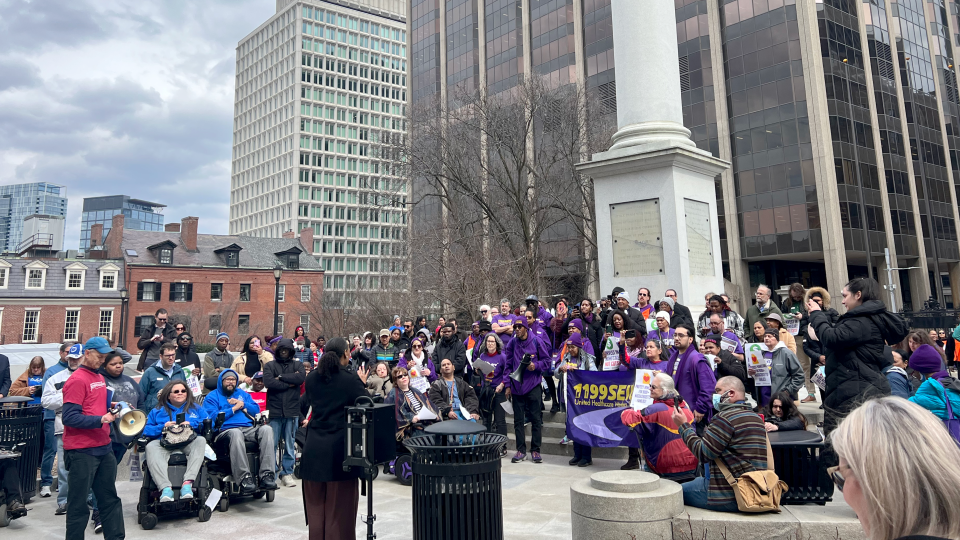Thousands of people who have been “warehoused” in Massachusetts nursing homes due to insufficient alternatives could soon receive the support they need to live independently.
Gov. Maura Healey’s administration on Tuesday announced that they reached an agreement on a federal class action lawsuit, filed in October 2022 in Boston, which contended Massachusetts was violating the Americans with Disabilities Act by allowing tens of thousands of people with disabilities to languish in nursing facilities, even though they could live on their own with proper support services. The David Marsters v. Maura Healey agreement, still subject to court approval, will expand and create new programs to help people transition out of facilities.
Disability advocates are praising the agreement and its potential to dramatically restructure how the state supports elderly residents and people with disabilities.
“We really believe it's going to transform Massachusetts’ long-term services for people with disabilities in the community,” said Steven Schwartz, special counsel with the Center for Public Representation, one of the groups that represented the plaintiffs.
Schwartz said he hopes the agreement can “change the culture” of nursing facilities to be focused on their original rehabilitative function, rather than a place “where people go because there's no alternative.”
The state says at least 2,400 people will be able to leave nursing facilities over the next eight years. Some people may be able to leave as soon as this summer.
“This settlement is a natural next step forward as our administration expands community living options available for individuals residing in nursing facilities,” Healey said in a statement. “We continue to look for opportunities to reduce disparities and inequities for older adults and individuals with disabilities and mental illness in Massachusetts.”
As part of the agreement, the state will expand funding opportunities for people in nursing facilities who want to live on their own, through residential services and accessibility modifications to their existing homes. Support will come in the form of rental subsidies and a rental voucher program, as well as employment assistance.
“Most importantly — new residential options for them to live in, because ultimately, a lot of people have gone to nursing homes because they don't have any other place to live,” Schwartz said.
The Executive Office of Health and Human Services says it will set up teams that will go to every facility and help residents understand their options for living in the community, and residents with mental illness will get specialized support. Case managers will help with the transition, and help them find support programs once they are settled, like securing medical equipment or hiring personal care attendants. The outreach programs will be tailored to target communities of color, who advocates say have been disproportionately impacted.
The options counseling will be key, as many people stuck in nursing facilities are isolated and under-resourced, said Bill Henning, executive director of the Boston Center for Independent Living.
He called the lawsuit a “fundamental human rights issue,” part of a broader independent living movement that has for decades aimed to move disabled people out of institutions.
“It really speaks to upholding everybody's individual dignity,” he said.
Advocates say that since the lawsuit was filed, the state had already started taking actions to help, like renewing MassHealth Money Follows the Person program, to help inform people about transitioning back to the community. Advocates were hoping for more robust services and support for once they leave facilities, which they say the lawsuit accomplishes.
For some residents, the agreement didn’t come soon enough
John Simmons was the lead plaintiff in the lawsuit when it was originally filed in 2022. But he died in summer of 2023 at age 74, before the resolution of the suit. He lived at the Rehabilitation & Nursing Center at Everett for four years. His lawyers hoped that he would be able to live his final years outside of a nursing home.
“I continue to this day to be very sad that we were not able to help him achieve that dream before he died,” said Deborah Filler, a lawyer with Greater Boston Legal Services, one of the groups that represented the plaintiffs.

Simmons had entered the nursing home after being hospitalized in Boston and after losing his subsidized housing. He only expected to stay in the nursing home for a short while, but struggled to find a place to live in the Boston area that was accessible and affordable.
“We need to re-enter our life at some point in time because it's almost like a prison sentence,” he told GBH News in an interview in November 2022.
At the facility in Everett, he said he felt trapped, isolated and unable to enjoy simple life pleasures like going to the grocery store or seeing the sunset. He joined the lawsuit because he saw first-hand how many people were stuck in nursing homes who could otherwise live independently.
“I will always be sad that we weren't able to help him achieve those very simple pleasures,” Filler said. “I know that he would be enormously proud of what the settlement agreement has accomplished.”








